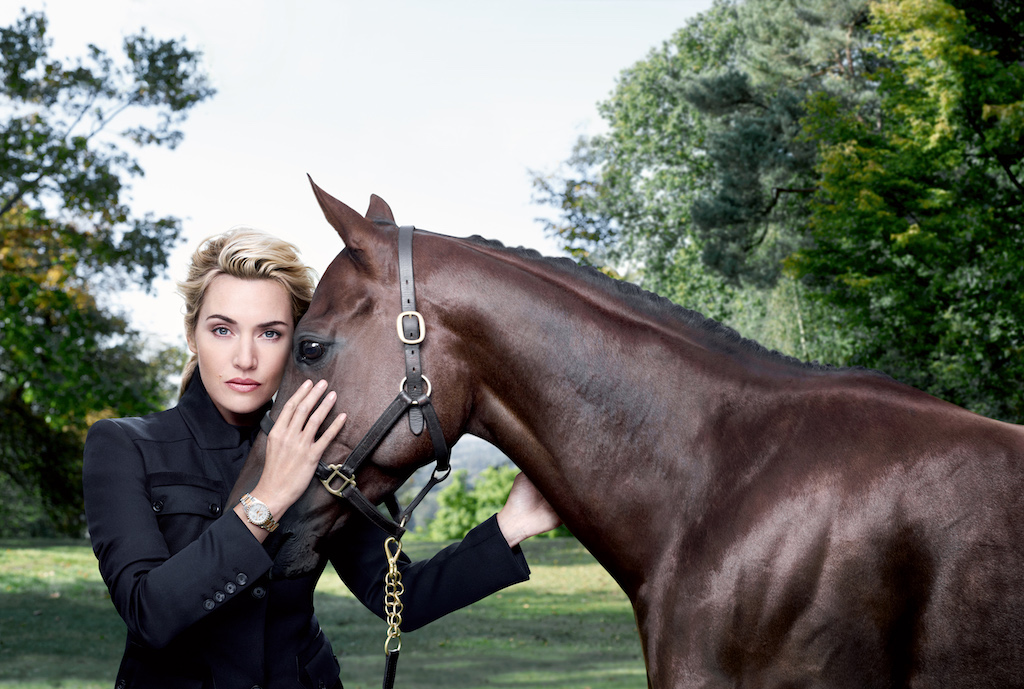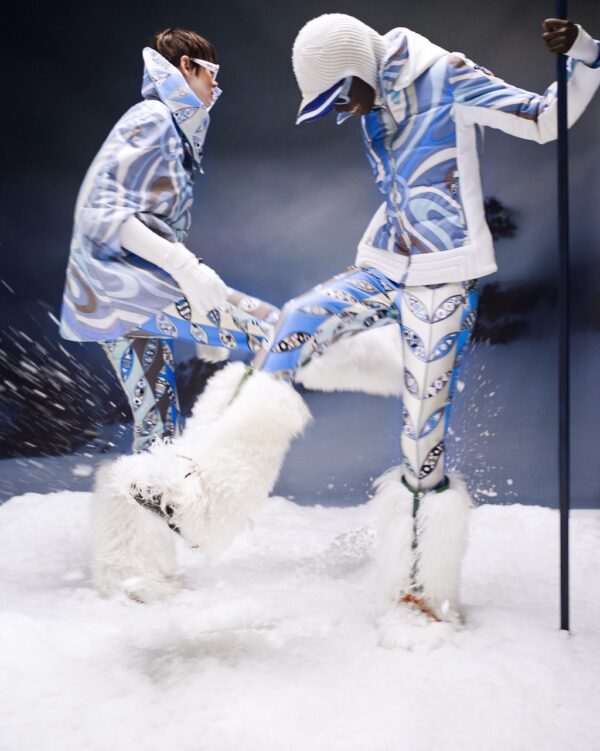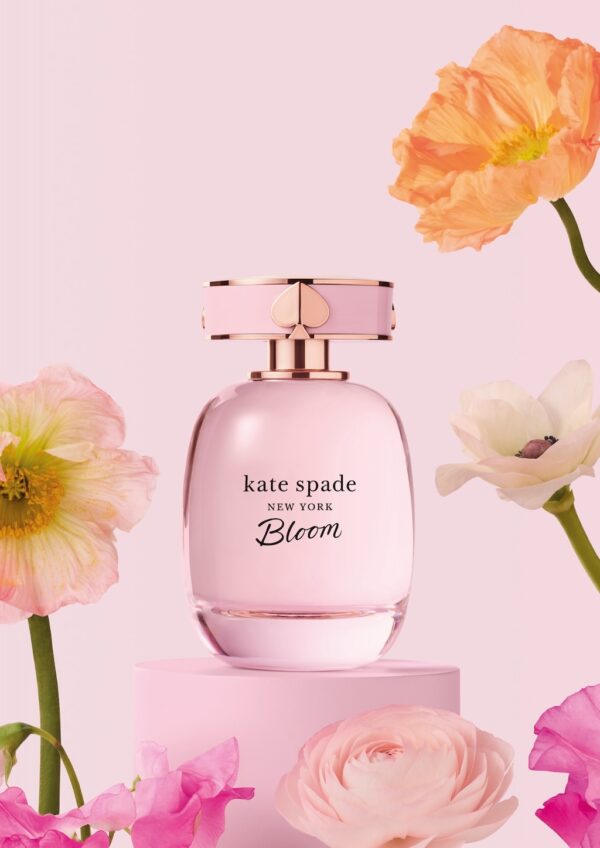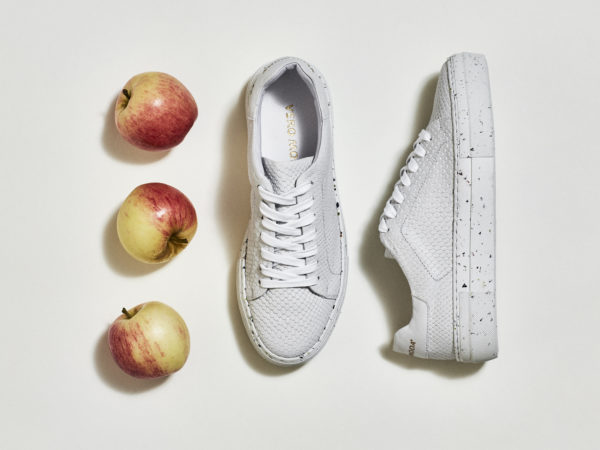At 46 years old and with an acting career spanning more than three decades, British actress Kate Winslet looks back at the film industry then and now. Once it was just being a white boy or a white girl but that side of the acting industry has fundamentally changed. Today, she experiences it as a very exciting time to be a middle-aged female actress, but apparently young up-and-coming actors are also experiencing great times. In Avatar 2: The Way of Water for instance.
Text Anja Van Der Borght
“Can I sit on the big couch?”, asks Kate Winslet. “It feels a bit like an exam, doesn’t it?” It is high summer when we meet British Oscar winner Kate Winslet in the suite of a Parisian hotel. Even in a simple black tennis dress with white trimmed short sleeves, black Vans and unmasked, she is stunning and exudes elegance.
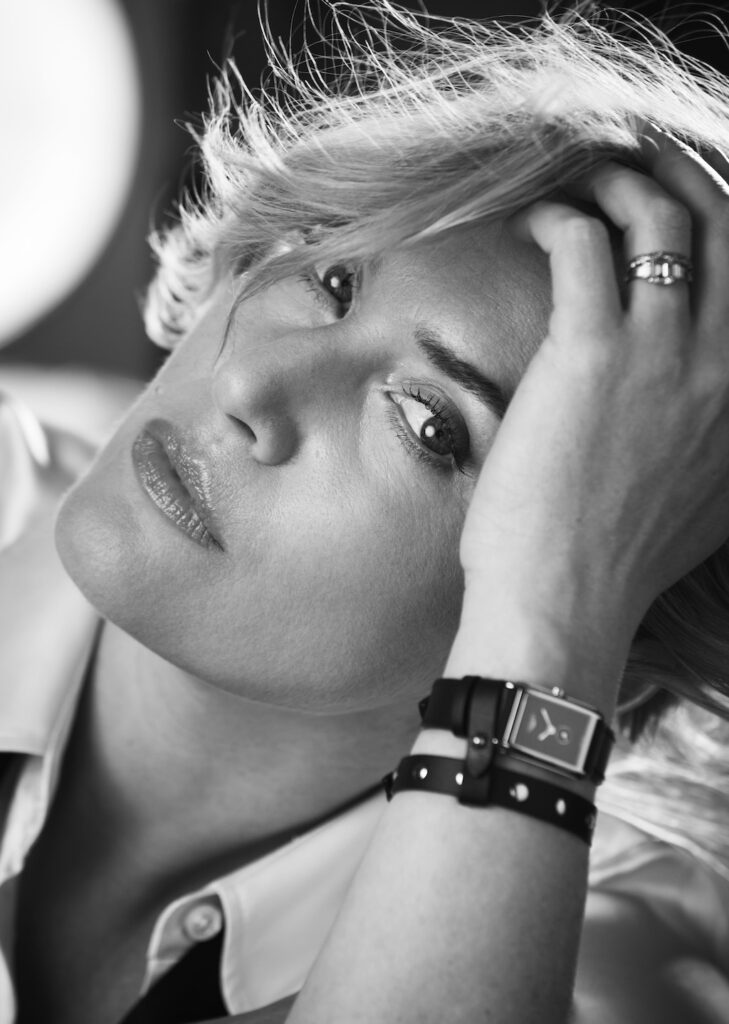
Maybe you’re the first to see this collection. What are your impressions of these new time pieces for Longines?
KW: “It’s just so different, I would never have thought of a double-strapped watch. So I think there’s something very, very unique about the design, but there’s also something extremely earthy about it. It feels very functional. It also has this kind of androgynous quality to it, so it feels very unisex, I think. My husband is obsessed with it, he absolutely wants one. I just think it’s so incredibly different. But what Longines does so well and has always done so well for over 100 years, is pay such extraordinary attention to detail. You know, that sense of precision, that sense of skill, that sense of craftsmanship and you can really see that I think with this watch. I love it, it’s just so different. I think it’s fantastic, it’s so cool.”
You’re the ambassador of elegance. What does elegance means to you personally?
KW: “Well, I think probably for all of us, I think our own concept of elegance and what it means to be elegant – I think that has changed so much, you know. It’s not the same as it was ten years ago. Elegance is something that both women and men can feel. And I think ten, twenty years ago, we would probably use that word more to describe a woman looking very fine and pulled together. And luxurious, there’s something, elegance and luxury ten years ago almost went hand in hand. But I think it’s different now: elegant is not a word we can just use for women, and that is the most important thing for me. So elegance means: feeling strong, feeling powerful, it means feeling that I have got something to say and that people are interested to join in a conversation. It means that we can all share a space together and feel equal. That to me is elegance. Elegance now to me goes hand in hand with power, as opposed to luxury. And I think for a lot of people, that is the way they feel. I think it has changed so much.”
A watch, how does it fit into your day? Do you look at it all the time, often, never?
KW: “I look at a watch all the time (laughs), I look at my watch all the time. Partly because – not just for timekeeping and I’m late for a lot of things – but because I don’t like to look at my phone so much for time. I think we all rely on our phones: what time is it? You pull it out your back pocket or your purse. And I don’t want to become that person. I’m trying to teach myself not to use my phone so much. I mean, I don’t have like a problem with my phone or anything – I don’t have any social media, so I’m never looking at things like that, I’m never idly just swiping, never – but I still don’t like going: what time is it? And automatically going for my iPhone. So the watch for me, there’s something really necessary about my watch. And I really feel very lost without it. I traveled recently somewhere and I forgot my watch. And I couldn’t believe how much more I found myself checking my phone to see the time. So it’s special. And also I think: when you have a watch that you really really love, I mean before this one I had my other Longines watch, it was the one I helped design for the Golden Hat Foundation ( a non-profit organization dedicated to changing the way people on the autism spectrum are perceived), which is absolutely so beautiful, the strap is absolutely divine. And it’s funny, when you… You can kind of develop a relationship with a time piece I think, depending on the moment in your life that it may have come to you, depending on who gave it to you, the story around it, but how much you use it. And actually that and that watch. There were children in my son’s class – he’s now eighteen years old – there were children in his class who have known him since he was twelve, and they all know that’s my watch. Because I see them all the time. And there’s one boy in particular, Freddie, who’s just obsessed with that watch and he’s always like: “Oh Kate, I just… ooh” So it’s almost like it’s part of my arm, that watch. They always know that, because I’m giving them lifts in the car so they always look at it because it’s always on my wrist. You know, there’s something lovely about that, for them that becomes part of their memory: that Joe’s mom would drive them and she had this watch. There’s something about a narrative for them in their memory tank, that I think is really lovely. And I remember my mother’s watch when I was younger. I think you do, you remember those things.”
It’s emotional, right?
KW: “I think it can be emotional. Especially if there is a story about how that watch came into your life and who gave it to you, how it came to be there. I think it can absolutely be emotional, yes.”
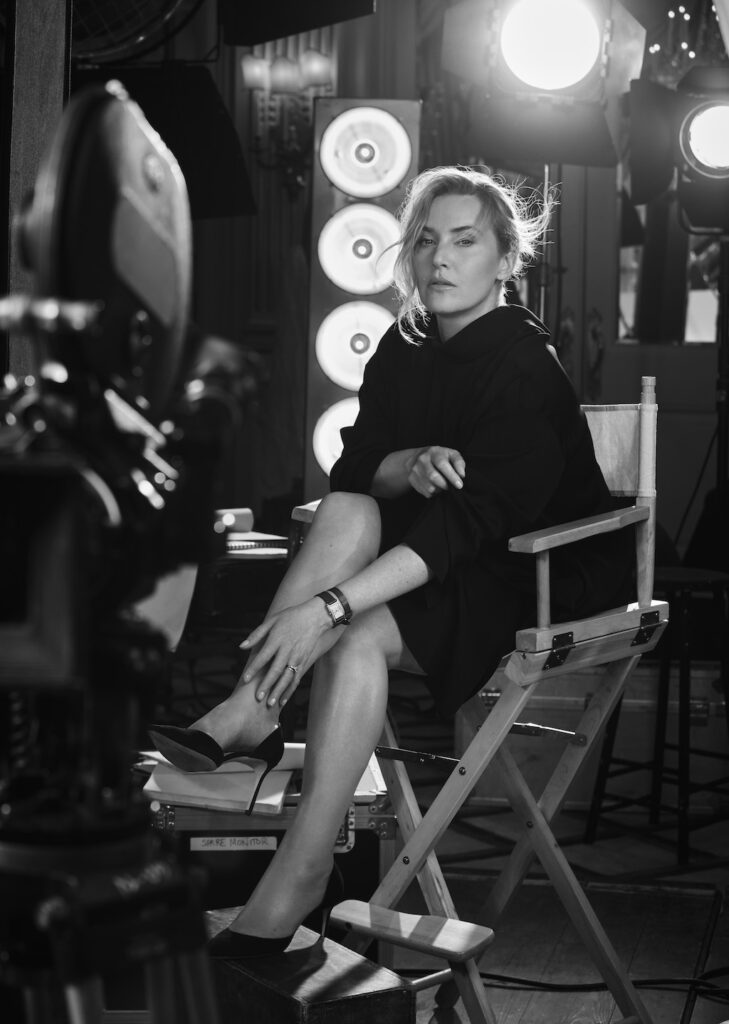
I interviewed you a long time ago and you told me you want to slow down the pace of life. Is that still the case? If so, what do you do to relax?
KW: Well, I’m getting better at relaxing. But I don’t do things like spa’s or stuff like that. I’m not really one of those spa kinds of people. So the way that I relax, honestly, is I make sure that I sit down at home on my couch and have a really great cup of coffee or tea and usually the dogs, my little son aside me, and just relax. Read a story to my little boy and just relax. And that for me is something that I’m really focusing on trying to build into my life, because otherwise: when do we sit down? I mean I’m sitting down on a sofa, the only other time I’m sitting down on a sofa is when I make myself at home. So I am trying to get better at that. As I’m getting older, I also make sleep a project of mine. So I – you know we now try and stick to a sort of a bedtime. Otherwise I think as an adult – when you’re younger, you tend to have a time that your parents would say: “Okay bedtime” – but as adults, we don’t have a bedtime anymore. There’s no one to say: “Okay you’re going to be tired, go to sleep.” So actually, my husband and I we’re trying to say: “Okay, lights out.” (laughs) We’re not doing very well, but we’re really trying. And I’m trying to get more sleep, because I can survive on very little. I can cope with six hours, but that’s not good. I need more. So that is something that I’m really paying a lot of attention to. But in terms of slowing things down, I’ve done quite well with that actually. By making sure that I’m not working as much as perhaps I did in my twenties or thirties. You know, my children are at different stages of their lives and need me for different things and I want to absolutely be able to look back and go: oh, I’m so glad I took that year off or that I took that time. So yes, I’ve gotten a lot better at that. I’ve really had some good periods of time, with no work at all. I feel very happy about that.”
Is there a kind of sport that is relaxing for you?
KW: “I love swimming, I love to swim. And that’s something actually that I wasn’t doing as much as I should and I really love it. So yes, I’ve actually been building that back into my life. My husband and I were just saying that we really want to try to talk to Longines about doing a tide watch, for the tides. Because they haven’t done that yet. And we live by the sea and we live our life by the tide, we really do. You know, we wake up in the morning: “Oh, is the sea there?” Oh no, it might be too far out. Or if the see is going to be in, we might have to wake up at six and go swim because the sea is right up. And my husband is always on the water sailing and with sports and things. So yes, I’m waiting for the tide watch.”
So do you go swimming every day?
KW: “I try to go swimming every day, yes. Especially in the winter, even more. We’ll go in the cold in the winter. The coldest we have ever been in was 4,5°C in Norway.”
It’s healthy!
KW: “It’s healthy, but it’s cold. But you just get addicted, we love it.”
I think a tide watch is a good idea but maybe it’s a bit difficult to realize technically?
KW: “Yes, I have absolutely no idea how they would make that. That’s not my department.”
I have been looking for a connection between the watch industry and the film industry. And I think both use a lot of magnificent technical possibilities in the realisation. In which way has this changed the way of acting in the last years?
KW: “Well, I was part of Avatar and Avatar is a very, very technical experience. But really fascinating to be part of that, because what they can do with computers now, it’s absolutely extraordinary. How they can use an actor’s entire movements and their eye balls and their teeth and their tongue. You can see all of these things, but it’s an animated, CGI (Computer-generated imagery) image. It’s completely incredible. And so yeah, the enormous advances in the computer-generated side of film making. It’s really exciting – I mean I remember ten years ago people were saying: “Oh there’ll be a time where they don’t need actors anymore.” But that’s not gonna happen, because Jim Cameron has proved that you can do both. And that in fact you really need the actor to create those expressions, those emotions. You know, they capture every single facial movement, every tiny muscle. Everything. And it’s all there. So I loved working on Avatar.”
And the second one is coming ?
KW: “Two and three. Yes, he’s very busy.”
Are there any parallels between your character in Avatar and your personal life?
KW: (laughs) “No. I mean, the only thing I would say that I did feel between my character and Zoe Saldana’s character is that we both play mothers. And they’re mothers who will do absolutely anything for their family, they will stop at nothing for their family. And that is like me and that is absolutely like Zoe. So that was a really nice connection for her and I, because actually our two characters are very different and they clash sometimes and they fight sometimes. It was this one thing that brought them together, so that’s really powerful and very special. But no, other than that: no. Completely different to my character.”
Sticking with the acting subject. Time is a sensitive subject in the industry, because it used to be the case that as you grow older, roles grow sparser for older actresses. It’s more difficult to find interesting roles that challenge them. Do you feel that that has changed or is changing?
KW: “I think it is changing, but I think it is changing slower than I think we’d like. But we do live in a time when women want to hear other women’s stories. And that’s really significant. We’re seeing more female directors now, a lot more female writers right now. So there are many more female-driven pieces. And back in the day, in these scripts, you were either the girlfriend or the young wife or the older mother to the male lead. And that has completely changed. There are very, very powerful, interesting stories now for women who are 40+, 50+, 60+. I mean, they do just keep coming. Plus, the industry has changed exponentially. There are so many streaming services now, the content is unbelievable. There is so much content, there are so many more people working in film, there are so many more roles for actors. So young actors – people who are getting into this as a career – often hear the words: “Oh, are you sure? You know, it’s hard to get work.” Actually now, it’s better than ever for a young actor coming into this industry, because there is just so much more available. Plus, I think casting directors and directors are much more open-minded than ever before. So they’re not pigeon-holed in their view of who can or who can’t play that role. They will be completely open to a much more evolved, integrated, diverse group of young individuals coming through those doors. Whereas once upon a time, it was a white guy or a white girl. That’s completely changed. That side of things has absolutely fundamentally changed and will never go back. And that’s almost, I think, more important. Because once we really ground these young people fully and integrate everyone who wants to be in this industry into this industry, and make them feel and let them know that there are roles for them, then all the other good things will follow. I really believe that. The canvas upon which we’re all labeled to function now, is so much bigger. So I think it’s a very, very exciting time to be a middle-aged female actor, but I also think it’s an exciting time to be a young emerging actor. I’ve really noticed that. Everybody’s talking about that.”
Have you got any ambition to teach young collegues?
KW: “Well, I sort of do all the time. One of the things I love about this job, is when I do get to work with younger actors. On Avatar there were a lot of younger actors, teenagers, and they were very nervous and excited and awkward, in themselves. And I have been there, I remember that. And also there were times where I felt like I was kind of alone like that. Because you have a director who will help you and encourage you, but actually when the camera’s aren’t rolling, you still have to emotionally keep yourself feeling strong and feeling good and confident. So I really enjoy spending time with younger actors and boosting them up and making them feel that they can do it and that they’re there for a reason and that they’re a part of something. And everyone performs better when they feel supported in that way. And that has become something that I am really aware of always doing and make sure that I do that and give proper time to those actor. Because it can be really terrifying.”
Talking about actors, I am from Belgium, so we would like to know what your best memories are from playing with Matthias Schoenaerts ?
KW: “He was just wonderful (sighs). He’s fun, he’s brilliant, he’s clever, he’s handsome. He’s so professional. He was a really great partner, a really great great partner. And he’s such a good guy, such a lovely man. So I felt very lucky to have that. Yeah, I just think he’s really talented. I loved working with him.”
How and how fast do you decide if you take a role or not? I loved you in Extras.
KW: “Uhm… Well, to be honest, the deciding part is pretty spontaneous. It’s normally very instinctive. It can be just: oh my god, I’d love to do this. And it just comes right away. And I often find that if I’m trying to wrap my head around maybe doing something, then probably it’s not quite right. And sometimes I will find myself getting distracted by other reasons why it could be a good idea to do something. Like: oh, it’s a really good time frame in terms of the kids’ school. Or: it’s going to film here. Or: that could work, because then we could do this and it wouldn’t be too disruptive. And actually in that scenario, I always end up going: oh, I’m looking at the wrong thing. Just stop. So it is usually fairly instinctive. And how do I… I mean again, it’s just instinctive. But if i read something and I think: oh my god, this is terrifying. Then usually that’s when I feel like: oh, maybe that’s what I should do (laughs). It’s true. I’ve actually almost said yes to something that I might be doing next year and even the thought of it is making me feel a bit sick, because I have absolutely no idea how I would really do it. But it’s so brilliant and it’s so completely brilliant and totally different to anything I’ve ever done before, and no I can’t tell you anything about it (laughs). But I’m hoping that that’s going to happen. But I read it and went: oh my god, this is brilliant. And it’s the writing, you know. Usually if the writing is really consistent and there’s isn’t much changes or adjusting that needs to happen, then it’s better for everybody. Because it just means you don’t have lots and lots of rewrite changes as you get closer. Because often what can happen when something is rewritten too many times or has too many people getting their hands in there, what can happen is that you loose the overall arc of something. And it becomes something different than what you originally said ‘yes’ to. So I do always look at the writing. And I appreciate really great writing, and I know what writers go through to do what they do. And I respect that and value it so much. So if I read something and I am saying it out loud as I’m reading it and I’m having a great time saying it out loud, that’s another big thing for me. I realize how excited I am looking forward to maybe saying those words. So that’s a pretty great feeling too.”
What recent role that you took on was terrifying at first?
KW: “Mare of Easttown. Even now I still think about it and it terrifies me and I’ve done it (laughs).”
It was terrifying for us too. It was unsettling to watch it…
KW: Yeah, try playing it (laughs). Yes, it was really… You know, very rarely a character will so get under your skin that it becomes part of your life, part of who you are. And that’s what happened for me with playing Mare. And I think it was partly because it was such an intense character, such an intense story and so brilliantly written. And we had amazing actors so it was partly that. But also that I ended up playing her for so long. Originally our shoot was still quite long: it was like 5,5 to six months. For seven hours of television, that’s much longer actually than a film. A film would normally be maybe between ten and fourteen weeks normally, a film. But this was obviously twenty-four weeks, a lot longer. But then Covid hit when I only had five weeks to go. So I was nearly done and Covid hit, and we stopped like the rest of the world. So from March until September of 2020 I was suddenly waiting to finish playing, I was hanging on to this character. Like so many people in my industry. And then we went back in September of 2020 and what was five weeks turned into nine weeks, because of all of our Covid protocols – everyday testing, not breaking for lunch because that was a health and safety hazard with everyone taking masks of and things – so we would have these kind of staggered lunches. So it just became much longer. So in the end, we started shooting Mare of Easttown in October of 2019 and I did not finish playing that character until December 7th 2020. So it was such a long time. And crazy things happened – has everyone seen it? You haven’t seen it? I won’t reveal anything. But there’s a scene in episode seven, a powerful, like climactic, massive scene. And the scene right before it, when my character figures out this moment, those two scenes were filmed over a year apart. And they literally come back to back in episode seven. In fact, the one before it, the scene before the climactic scene, was filmed in my first week of shooting on the entire show in October 2019 and the scene immediately following it was November 2020. So crazy stuff like that. So having to hang on to a character and having to sow her into my body, to such an extent. And it was just scary every day, every part of it. The accent, the character, having to truly be another person so completely. Because people know what I sound like. I’ve been doing this job for nearly 30 years, so audiences are familiar with how I will sound when I open my mouth and speak as I’m doing right now. So to be convincing as this other person, I had to really be so convincing to get people to the point that they would just forget…”
To me, you were totally gone. You were looking so different. I lost you.
KW: “Thank god! Great!”
But I was going to add: how long does it usually take to shed a character?
KW: “It took me over a year with that one. To my surprise, actually, to my complete surprise and shock. It sounds mad, because I’m not really like a method actor or something like that. I mean I do get very involved in the jobs that I do, just because I care so much and, also to be honest, I just don’t want to fuck it up. So I really want to work as hard as I can to make sure that I am really doing the thing that they asked me to do. But with Mare, it really shocked me, when I started doing the press for the show I was having a really hard time talking about it. It would affect me. I would sometimes even have to stop an interview and say: ‘Sorry, we’ll have to pick this up tomorrow.’ Crazy. And then I was like: I need to just take some time.”
Talking about all the scary, terrifying things. What keeps you awake at night?
KW: “Nothing, I sleep so well (laughs). What keeps me awake at night is when Ned is snoring or one of the dogs is barking. No, I’m very good at that, I’m very good at processing anxiety or worries. I’m really able to find ways to deal with those things.”
Are you not worried about something in the future?
KW: “What’s the point worrying? Life’s too short. I get that from my dad. He’s always like: “Well, what’s the worst that could happen? Life’s too short.”
